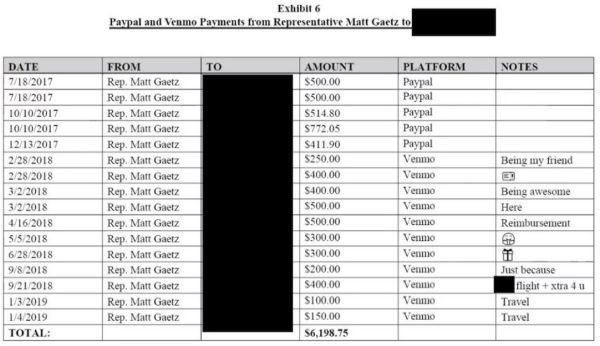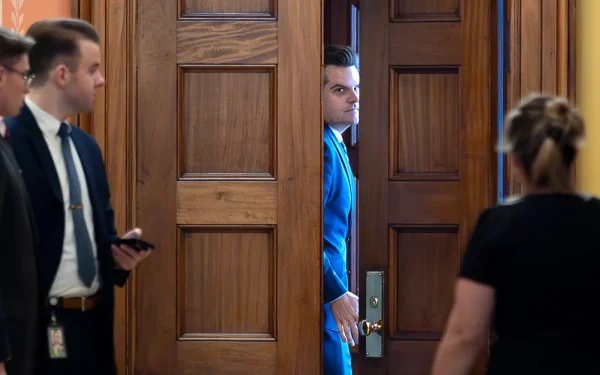After two years of anticipation and investigation, the House Ethics Committee released its report on Dec. 23 regarding the allegations against former Representative Matt Gaetz. Unsurprisingly, the findings reveal a troubling pattern of misconduct. The report illustrates a colorful portrait of blatant misconduct, statutory rape, solicitation of sex in exchange for money and gifts, illegal drug use and misuse of campaign funds. This report is another on a long list of ethical breaches within what is supposed to be the country’s legislative body. The investigation involved issuing and authorizing 29 subpoenas, interviewing more than 24 witnesses and reviewing nearly 14,000 documents.
The allegations against Gaetz first came to light in March 2021, when the Department of Justice (DOJ) announced they were launching a criminal investigation into the allegations of sex trafficking and transporting of a minor across state lines. Although the DOJ determined they wouldn’t press charges in Feb. 2023, the House Ethics Committee pursued their own investigation. Their investigation focused on claims that Gaetz engaged in sexual misconduct, converted campaign funds to personal use, shared inappropriate images while on the house floor and accepted impermissible gifts.
In June 2024, the Committee expanded its search parameters to include allegations that Gaetz gave special favors to individuals with advantageous or personal connections to obstruct government investigations into his conduct. However, the Committee chose not to investigate specific claims further, including allegations of personal use of campaign funds, acceptance of bribery and inappropriate conduct on the House floor.
In Nov. 2024, Gaetz resigned from his position in the House after being nominated by President-elect Donald Trump to serve as Attorney General of the United States. Gaetz’s resignation immediately halted the Committee’s investigation, as it lost jurisdiction. Despite losing jurisdiction, the Committee chose to release its report, citing the public interest as a driving factor in its decision.
In the report’s introduction, the Committee summarized the substantial evidence it had found regarding several accusations against Gaetz:
- Between 2017 and 2020, Gaetz had routinely paid women to engage in a sexual relationship with him.
- In 2017, Gaetz engaged in a sexual relationship with a 17-year-old, corroborating allegations of statutory rape.
- From 2017 to 2019, Gaetz used and possessed illegal drugs, including cocaine and ecstasy.
- In 2018, Gaetz directed his Chief of Staff to help a woman he was sexually involved with obtain a passport, falsely claiming to the U.S. Department of State that she was a constituent.
- Gaetz accepted gifts, including travel and boarding for a trip to the Bahamas in 2018, that exceeded the permissible amount.
- Gaetz both knowingly and intentionally attempted to “impede and obstruct” the Committee’s investigation into his conduct.
The Committee concluded that these actions constituted a violation of House Rules, along with federal and state laws, prohibiting solicitation of prostitution, statutory rape, illegal drug use and acceptance of gifts deemed impermissible by the House. Additionally, the report found evidence that Gaetz received special favors, offered privileges to individuals and knowingly tried to obstruct Congress. While the report found that Gaetz transported women across state lines for the purpose of soliciting sex, they found no evidence that any of these women were minors at the time.
Sexual misconduct/procurement of sex in exchange for money/gifts
The Committee’s investigation uncovered evidence that Gaetz engaged in relationships with young women, many of whom were compensated for their company or services. The report points to a variety of Cashapp, PayPal and Venmo transactions with obscure descriptions, supporting claims that Gaetz exchanged money for sex. Joel Greenberg, a tax collector in Seminole County, Florida and associate of Gaetz, provided sworn testimony regarding many of these encounters. Greenberg, who pleaded guilty to sex trafficking charges in 2021, acted as an intermediary between Gaetz and several of the women he engaged in sexual relationships with. Greenberg connected Gaetz with women through a Seeking Arrangements account.

One series of text messages from the account includes a conversation between Greenberg and a 20-year-old woman. In it, he suggests she bring a friend for Gatez and that the four of them meet up. The woman states that her rate is around $400 per meetup, to which Greenberg replies that he “understands the deal.” Greenberg also inquires whether they are old enough to drink and sends her a photo of Gaetz. The woman responds that her friend thought Gaetz “was really cute.”
The Committee found substantial evidence that Gaetz was fully aware of the “transactional nature” of these relationships. In one text exchange, Gaetz disputes one woman’s request for money, claiming she only gave him “a drive by.” Other women interviewed by the Committee described that there was a “general expectation of sex” in these arrangements. One woman stated she received over $5,000 from Gaetz between 2018 and 2019, adding that “99 percent of the time they were together, sex was involved.”
The report indicates that most of the instances where Gaetz exchanged sex for money took place in Florida, particularly in Orlando. Many of the women involved were students based in that area. The Committee also found evidence of several occasions where Gaetz traveled with some of the women he paid for sex. For instance, during a trip to New York City in Jan. 2019, Gaetz paid for two women to accompany him. Messages investigators found showed Gaetz asking, “Who can help with party favors?” before arranging for the women to procure drugs for the trip. The Committee found evidence that Gaetz sent women money in exchange for sexual activities during this trip.
While almost all of the women interviewed by the Committee stated that their sexual relationship with Gaetz was consensual, one expressed concerns to investigators that drugs used at the parties and events may have “impaired her ability to really know what was going on or fully consent.” The Committee emphasized in the report that “nearly every woman the Committee spoke with could not remember the details of at least one or more of the events they attended with Gaetz and attributed that to drug or alcohol consumption.”
Several women shared accounts with investigators describing their feelings of uncomfortableness during their interactions with Gaetz. One woman described how Gaetz would try to convince her to have sex with him or Greenberg, stating, “He would make me feel bad about not having sex with him or [Joel] Greenberg,” she went on to explain that he would say things like “Why don’t you want to have sex with me?” or “Mr. Greenberg looks very sad over there….make him happy.” Another woman said their initial relationship was a “loving friendship,” but as time progressed, it began to “feel like a task.” Another woman in the report reflected on her experiences, saying, “When I look back on certain moments, I feel violated.” Another noted, “I think about it all the time…I still see him when I turn on the TV, and there’s nothing anyone can do. It’s frustrating to know I lived a reality that he denies.”
Statutory rape of a minor
The Committee detailed explicit accounts of a party held on July 15, 2017, at the home of former Florida Representative Chris Dorworth. The report also points to a number of the party’s attendees, including Gaetz, Greenberg, Gaetz’s then-girlfriend and several other women, including Victim A, who was 17 at the time. It was at this party where Gaetz was accused of having sex with “multiple women, including the 17-year-old, for which they were paid.” The Committee received witness testimony that Victim A and Gaetz engaged in sexual intercourse twice during the party, with at least one of these encounters occurring in the presence of other attendees. They also reported having “credible testimony” from Victim A and corroboration from multiple individuals. Victim A informed the Committee that she had been paid $400 in cash by Gaetz at the end of the night, “Which she understood to be payment for sex.”
Although the Committee found no evidence that Gaetz was aware Victim A was a minor at the time of their sexual encounter, the woman told investigators that she didn’t disclose her age; he also never asked. The report states that Gaetz learned that she was a minor more than a month after the party but continued to maintain contact with her. The report further reveals that Gaetz met up with her again and engaged in “commercial sex” with her again less than six months after she turned 18.
Federal laws
The Mann Act prohibits knowingly transporting individuals across state or international borders for the purpose of engaging in prostitution or illegal sexual activity. Section 1791 of Title 18, United States Code, further prohibits trafficking adults for commercial sex through the use of “force, threats of force, fraud or coercion.”
Federal law also criminalizes the obstruction of Congress. It is a crime to, or attempt to, “corruptly” influence, obstruct or impede a House Committee’s “due and proper exercise of the power of inquiry” or attempt to do so. Additionally, it is unlawful to knowingly intimidate a witness or to “corruptly persuade” an individual to withhold or alter evidence or to prevent their testimony in an official proceeding.
State laws
Florida’s statutory rape law makes it a felony for any individual 24 years or older to engage in sexual activity with a person who is 16 or 17 years old. Ignorance of the minor’s age is not a permissible defense for an individual charged with this offense.
In Florida, it is also a criminal offense to solicit, induce, entice or procure another individual to engage in prostitution or “to purchase the services of any person engaged in prostitution.” Under state law, prostitution is defined as the “giving or receiving of the body for sexual activity for hire but excludes sexual activity between spouses.” Additionally, Florida State law prohibits the possession of unauthorized controlled substances, including drugs such as ecstasy, molly, and others.
House Rules and standards of conduct
Under the House Code of Official Conduct, all members are required to “act at all times in a manner that reflects creditably on the House.” The misuse of campaign funds violates both federal election laws and House guidelines, which explicitly prohibit the misuse of campaign funds for personal gain. Gaetz’s attempts to intimidate witnesses violated ethical standards and legal principles, undermining the honesty and integrity of the Committee’s investigative processes.
The House also has strict regulations regarding the acceptance or solicitation of gifts. According to the Gift Rule, members of the House may not accept gifts under specific exceptions outlined in the rule. The Ethics Manual defines gifts as “gratuities, favors, discounts, entertainment, hospitality, loans, forbearances, services, training, travel expenses, in-kind contributions, advanced payments and reimbursements after the fact.” Members can accept gifts valued at less than $50, provided that the individual gifting it is not “a registered lobbyist, foreign agent or private entity that retains or employs such individuals.”
Gaetz’s defense & response

While Gaetz failed to appear before the Committee, he did respond to requests for comment, stating that the allegations that he “may have engaged in sexual misconduct including violations of federal laws relating to sex trafficking and state laws relating to prostitution and statutory rape” were “false.” He claimed that the DOJ investigated these allegations, which were “completely dropped.” Gaetz repeatedly and incorrectly stated that the DOJ had “exonerated” him and denied using illegal drugs.
When supplied with the names, amounts paid and dates of transactions involving more than 15 women, Gaetz failed to provide any explanation for those payments. When given the opportunity to formally assert that he never paid for sex, Gaetz declined, stating that “asking about his sexual history as a single man with adult women is a bridge too far.”
In Sep. 2024, the Committee sent a letter to Gaetz asking him to address specific questions, including whether he was present at the July 2018 party at Dorworth’s residence, whether he had engaged in sexual activity with Victim A and whether he had given Victim A money. Gaetz refused to answer any of these questions.
Committee’s findings
The Committee did not find sufficient evidence to conclude that Gaetz violated federal sex trafficking laws. The youngest individual found to have traveled with Gaetz was 18 at the time of the trip. Neither she nor other women on the trip could recall being explicitly paid for sexual encounters during that time. However, one woman testified that she wasn’t compensated for sex she had with Gaetz on the trip because “the trip itself was more so the payment.” Although the evidence showed Gaetz paid women to accompany him on trips to New York City and Washington D.C. for commercial sex, the Committee stated that “while Representative Gaetz’s relationship with these women involved an exploitative power imbalance,” they did not find evidence that he used force, fraud or coercion “as those terms apply under the applicable laws.”
The Committee did find substantial evidence that Gaetz paid women for sex and arranged for others to pay on his behalf. Testimony from more than six witnesses who attended parties or trips with Gaetz from 2017 to 2020 indicated that nearly every woman interviewed had been paid for sex by or on behalf of Gaetz. The Committee determined that Gaetz enticed and procured women to engage in sexual relationships in exchange for money, violating Florida’s state laws.
Additionally, the Committee found substantial evidence that Gaetz violated Florida’s statutory rape law by engaging in a sexual relationship with a 17-year-old. Testimony from Victim A and several other credible witnesses, under oath and before a grand jury, corroborated these claims. The Committee emphasized that statutory rape in Florida is strictly a liability rime, meaning Gaetz is still liable despite not learning Victim A was a minor until over a month after their initial encounter.
The Committee found evidence that Gaetz used cocaine, ecstasy and marijuana. Two witnesses reported seeing him use cocaine and ecstasy at various events. The report also revealed that Gaetz created an email account from his office in the Capitol under a pseudonym to purchase marijuana. The Committee also found evidence that Gaetz and his associates supplied drugs to women.
The Committee determined that Gaetz violated the House Gift Rule, abused his position to grant special privileges and favors and attempted to obstruct the investigation into his conduct. Regarding the House Gift Rule, the report cited his aforementioned trip to the Bahamas, which included travel on a private plane and funds for other travel expenses, none of which were disclosed on his financial disclosure forms. Despite being asked repeatedly, Gaetz failed to provide any evidence of how he paid for the trip, aside from his flight to the Bahamas.
The Committee also found that Gaetz used his position of power to assist a woman, with whom he was engaged in a sexual relationship, in obtaining a passport while also falsely identifying her as his constituent. This directly violated the rules of the House, which prohibited the granting of special favors and privileges.
Finally, the Committee concluded that Gaetz engaged in obstructive behavior during the investigation. Despite publicly stating he would, he failed to produce any materials to support his claims of innocence. The Committee noted that Gaetz attempted to deflect, deter or mislead the investigation to prevent exposure of his actions. He repeatedly delayed and ignored requests to produce any relevant evidence or information.
Conclusion
The Committee determined that there was substantial evidence to corroborate allegations that Gaetz violated House Rules and other standards of conduct, including the procurement of prostitution, statutory rape, illegal drug use, acceptance of impermissible gifts, granting special favors or privileges and obstruction of Congress.








